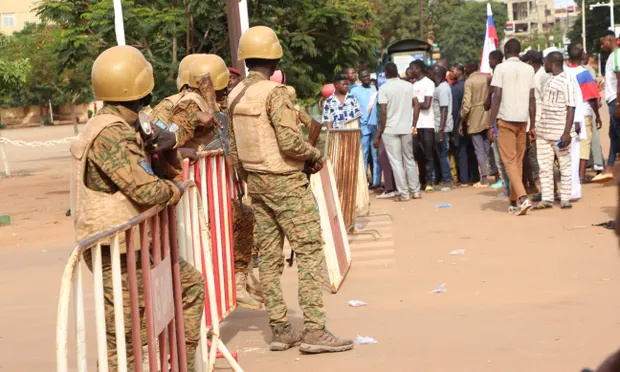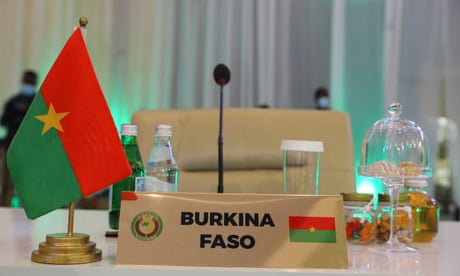Burkina Faso’s military leader ousted in second coup this year

Army officer Captain Ibrahim Traore has overthrown Paul-Henri Damiba, eight months after he took power
Members of Burkina Faso’s army have seized control of state television, declaring that they had ousted military leader Paul-Henri Damiba, dissolved the government and suspended the constitution and transitional charter.
In a statement read on national television late on Friday, Captain Ibrahim Traore said a group of officers had decided to remove Damiba due to his inability to deal with a worsening Islamist insurgency. He announced that borders were closed indefinitely and that all political and civil society activities were suspended.
It is the second takeover in eight months for the west African state. Damiba took power in a coup in January that ousted democratically elected president Roch Marc Kaboré.
Damiba and his allies promised to make the country more secure, but violence has continued unabated and frustration with his leadership has grown in recent months.
The statement came after a day of uncertainty, with gunfire ringing out in the capital, Ouagadougou.
“In the face of the continuing deterioration of the security situation, we have repeatedly tried to refocus the transition on security issues,” said the statement read aloud on Friday evening by the soldiers. The soldiers promised the international community they would respect their commitments and urged Burkinabes “to go about their business in peace.”
Amid growing uncertainties, the UN voiced concern and appealed for calm.
“Burkina Faso needs peace, it needs stability, and it needs unity in order to fight terrorist groups and criminal networks operating in parts of the country,” UN spokesperson Stéphane Dujarric said.

On the streets of Ouagadougou, some were showing support for the country’s new leaders.
“We are demonstrating to support this coup, confirmed or not,” said Francois Beogo, a political activist from the Movement for the Refounding of Burkina Faso. “For us, it is already a coup.”
Beogo said Damiba “has showed his limits” during his short time in power. “People were expecting a real change,” he added.
Some demonstrators voiced support for Russian involvement in order to stem the violence, and shouted slogans critical of France, Burkina Faso’s former coloniser. In neighbouring Mali, the junta invited Russian mercenaries from the Wagner Group to help secure the country, though their deployment has drawn international criticism.
Last week, Damiba had travelled to New York where he addressed the UN general assembly. In his speech, Damiba defended his January coup as “an issue of survival for our nation”, even if it was “perhaps reprehensible” to the international community. On Thursday, he had given a speech in Djibo, in Burkina Faso’s volatile north.
Burkina Faso’s January coup followed similar takeovers in Mali and in Guinea, heightening fears of a rollback of democracy in west Africa. None of the juntas have committed to a date for new elections, though Damiba said last week that the transition in Burkina Faso would last for almost two more years.
Many in Burkina Faso initially supported the military takeover, frustrated with the previous government’s inability to stem Islamist violence that has killed thousands and displaced at least 2 million. Yet the violence has failed to wane in the months since Damiba took over. Earlier this month, he also took over the position of defence minister after dismissing a brigadier general from the post.
Earlier this week at least 11 soldiers were killed and 50 civilians went missing after a supply convoy was attacked by gunmen in Gaskinde commune in Soum province in the Sahel. That attack was “a low point” for Damiba’s government and “likely played a role in inspiring what we’ve seen so far today”, said Eric Humphery-Smith, senior Africa analyst at risk intelligence company Verisk Maplecroft.
Chrysogone Zougmore, president of the Burkina Faso Movement for Human Rights, called Friday’s developments “very regrettable”, saying the instability would not help in the fight against the extremist violence.
“How can we hope to unite people and the army if the latter is characterised by such serious divisions?” Zougmore said. “It is time for these reactionary and political military factions to stop leading Burkina Faso adrift.”






